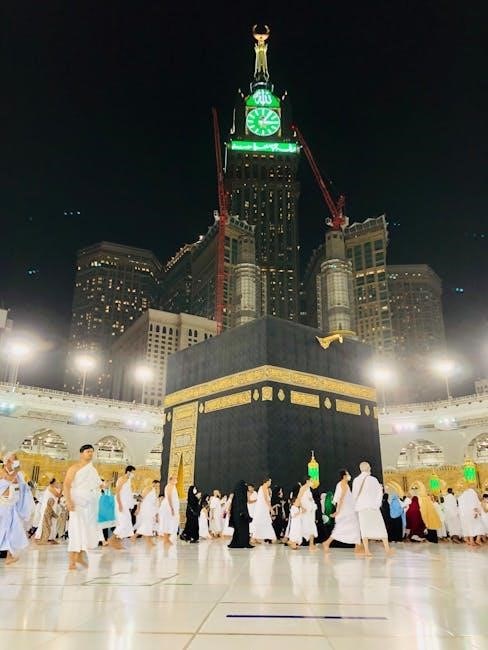Tawaf is a sacred Islamic ritual involving seven anti-clockwise circumambulations around the Kaaba. It symbolizes unity, devotion, and remembrance of Allah. The practice is integral to Umrah and Hajj, fostering spiritual connection. PDF guides like “Duas for Tawaf and Sai” by Shaykh Shah Hakeem Akhtar offer comprehensive supplications for each round, enhancing the pilgrim’s experience. These resources provide structured prayers, ensuring a meaningful and guided Tawaf journey.
Understanding Tawaf in Islamic Rituals
Tawaf is a central Islamic ritual performed during Umrah and Hajj, involving seven anti-clockwise circumambulations around the Kaaba. This act symbolizes unity, submission, and devotion to Allah. The Kaaba, Islam’s holiest site, represents a spiritual focal point for Muslims worldwide. Tawaf is completed in a state of purity, with men often performing the first three rounds at a hastened pace (Rami), while women walk normally. Each round is accompanied by specific supplications, emphasizing spiritual reflection and divine connection. The ritual underscores the importance of intention, humility, and mindfulness, fostering a profound sense of closeness to Allah. It is a physical and spiritual act of worship, deeply rooted in Islamic tradition and practice.

The Importance of Supplication During Tawaf
Supplication during Tawaf is vital, as it enhances the spiritual experience and the acceptance of prayers. Reciting specific duas from PDF guides like “Duas for Tawaf and Sai” ensures a meaningful connection with Allah, fostering divine acceptance and spiritual growth.
Maximizing Spiritual Benefits Through Duas
Maximizing spiritual benefits during Tawaf requires heartfelt recitation of specific duas. Each round offers an opportunity to seek Allah’s mercy and blessings. Using resources like “Duas for Tawaf and Sai” ensures pilgrims recite authentic supplications, enhancing their connection with the divine. These prayers, often found in PDF guides, are designed to align with the sacred act of circumambulation, fostering a deeper sense of spirituality and humility. By reciting these duas, pilgrims can focus on their faith, seek forgiveness, and strengthen their relationship with Allah, making their Tawaf experience more meaningful and spiritually rewarding.
Detailed Guide to Duas for Each of the Seven Rounds
A comprehensive guide outlines specific duas for each of the seven Tawaf rounds, ensuring pilgrims align their supplications with the sacred ritual’s spiritual significance. PDF resources like “Duas for Tawaf and Sai” provide structured prayers for each round, enhancing the worshippers’ connection to Allah and deepening their devotion during this profound Islamic practice.
Dua for the First Round of Tawaf

The third round of Tawaf is a moment of deep reflection and connection with Allah. Pilgrims are encouraged to recite specific supplications, such as seeking blessings and divine mercy. A recommended dua is: “Rabbana atina fid-dunya hasanatan wa fil-akhirati hasanatan wa qina adhaban-nar.” This prayer, meaning “Our Lord, grant us good in this world and good in the Hereafter, and protect us from the torment of the Fire,” reflects a humble request for divine grace and protection. Reciting such duas during the third round enhances the spiritual experience, fostering a sense of gratitude and hope for Allah’s mercy. This round is also an opportunity to seek forgiveness and strengthen one’s faith.
Dua for the Second Round of Tawaf
The second round of Tawaf is a profound opportunity to deepen your spiritual connection with Allah. A recommended supplication during this round is: “Rabbana afrigh ‘alayna sabran wa thabbit aqdamana wa inna yaqeen.” This translates to, “Our Lord, pour upon us patience and make our feet firm, and grant us certainty.” This dua emphasizes seeking strength, stability, and unwavering faith in Allah’s plan. Reciting such prayers during the second round helps pilgrims reflect on their journey, both physically and spiritually. It serves as a reminder to remain steadfast in the face of challenges and to trust in Allah’s divine mercy and guidance. This round is also a time to express gratitude for the opportunity to perform Tawaf and seek blessings for oneself and others.
Dua for the Third Round of Tawaf
During the third round of Tawaf, a recommended supplication is: “Rabbana ighfir warham wa anta khayrur rahimin.” This translates to, “Our Lord, forgive and have mercy, and You are the best of the merciful.” This dua emphasizes seeking Allah’s forgiveness and mercy, reflecting the pilgrim’s humility and desire for spiritual purification. Reciting this prayer during the third round serves as a reminder of Allah’s boundless compassion and encourages the pilgrim to reflect on their actions and seek forgiveness. It is a moment to reconnect with Allah, expressing gratitude for His blessings and seeking guidance for the journey ahead. This supplication resonates deeply, fostering a sense of humility and devotion in the heart of the believer.
Dua for the Fourth Round of Tawaf
During the fourth round of Tawaf, a recommended supplication is: “Rabbana atina fid-dunya hasanatan wa fil-akhirati hasanatan wa qina adhaban-nar.” This translates to, “Our Lord, grant us good in this world and good in the Hereafter, and protect us from the torment of the Fire.” This dua reflects a deep desire for Allah’s mercy and blessings in both worldly and spiritual aspects of life. It also emphasizes seeking refuge from the punishment of Hellfire, fostering a mindset of gratitude and humility. Reciting this prayer during the fourth round aligns the pilgrim’s heart with the divine, reinforcing their faith and commitment to righteousness. It is a moment to seek Allah’s favor and protection, embodying the essence of Tawaf as a spiritual cleansing ritual.
Dua for the Fifth Round of Tawaf

During the fifth round of Tawaf, a recommended supplication is: “Allahumma ighfir li dhanbi kulla dhanbin, wa akhzin li kulli hasanatin, wa ajirni min kulli ithmin, wahdini li afwalil hasanat.” This translates to, “O Allah, forgive me all my sins, guide me to all good deeds, protect me from all misdeeds, and direct me to the best of virtues.” This prayer emphasizes seeking forgiveness, guidance, and moral excellence. It reflects a pilgrim’s desire for spiritual purification and divine assistance in adhering to righteous conduct. Reciting this dua during the fifth round underscores the importance of self-reflection and seeking Allah’s mercy, aligning one’s actions with His will and striving for moral elevation. It is a moment to renew one’s commitment to a virtuous life.
Dua for the Sixth Round of Tawaf
During the sixth round of Tawaf, a recommended supplication is: “Allahumma ighfir li dhanbiyal-lathi yaqifu al-shaytamu an shukrika wa bi rahmatika.” This translates to, “O Allah, forgive me for the sins that Satan uses to prevent me from being grateful and from Your mercy.” This prayer highlights the need for divine forgiveness and protection from satanic influences. It reflects a pilgrim’s awareness of the spiritual battle and the desire to remain steadfast in gratitude and faith. Reciting this dua during the sixth round serves as a reminder to seek Allah’s protection and mercy, emphasizing the importance of maintaining a grateful and righteous heart. It is a moment to seek divine intervention in overcoming spiritual challenges.
Dua for the Seventh Round of Tawaf
During the seventh round of Tawaf, a recommended supplication is: “Rabbana atina fid-dunya hasanatan wa fil-akhirati hasanatan wa qina adhabannar.” This translates to, “Our Lord, grant us good in this world and good in the Hereafter, and protect us from the torment of the Fire.” This prayer encapsulates the pilgrim’s desire for blessings in both worldly and eternal life, while seeking refuge from divine punishment. It is a moment of profound reflection, marking the completion of the seven rounds. Reciting this dua emphasizes the pursuit of righteousness, the avoidance of sin, and the aspiration for Allah’s mercy and grace. It concludes the Tawaf with a heartfelt plea for divine favor and protection.

Additional Prayers and Supplications for Tawaf
Beyond the seven specific rounds, additional prayers and supplications can enhance the Tawaf experience. Muslims often recite general supplications, seeking forgiveness, blessings, and protection. One recommended prayer is “Rabbighfir warham wa anta khayrur rahimeen,” asking Allah for forgiveness, mercy, and guidance; Another is “Subhanallah” and “Allahu Akbar,” glorifying Allah and acknowledging His greatness. Pilgrims may also invoke blessings upon the Prophet Muhammad (peace be upon him) and reflect on personal intentions. These prayers deepen the spiritual connection and fulfill the purpose of Tawaf as a means of worship and submission. Personalized supplications are also encouraged, making the ritual a unique opportunity for heartfelt communication with Allah.
Recommended PDF Resources for Tawaf Duas
Several PDF resources provide comprehensive guidance on Tawaf supplications, including “Duas for Tawaf and Sai” by Shaykh Shah Hakeem Akhtar. This document offers detailed prayers for each of the seven rounds, ensuring a structured and meaningful Tawaf experience. Another valuable resource is “A Dua Guide for Umrah” by Waseem Mirza, which includes step-by-step supplications for Tawaf and Saee. These PDFs are widely available online and serve as essential companions for pilgrims seeking to enrich their spiritual journey. They provide Arabic texts, translations, and interpretations, making them accessible for Muslims worldwide. Utilizing these resources helps pilgrims perform Tawaf with focus and devotion, ensuring they maximize the spiritual benefits of this sacred ritual.
Tawaf is a profound act of worship that strengthens spiritual connection with Allah. By incorporating heartfelt supplications during each round, pilgrims can deepen their devotion and seek divine blessings. Utilizing recommended PDF resources, such as “Duas for Tawaf and Sai” and “A Dua Guide for Umrah,” provides structured guidance, ensuring a meaningful and focused experience. These resources offer authentic supplications, fostering a sense of unity and purpose. Embracing these practices enhances the spiritual significance of Tawaf, making it a transformative journey of faith, reflection, and gratitude. May Allah accept your Tawaf and grant you peace and prosperity in this life and the hereafter.
